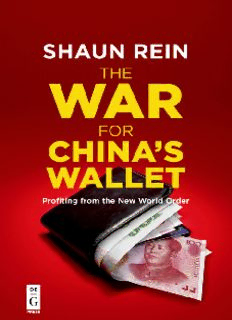Table Of ContentShaun Rein
The War for China’s Wallet
Shaun Rein
The War for
China’s Wallet
Profiting from the New World Order
ISBN 978-1-5015-1594-1
e-ISBN (PDF) 978-1-5015-0761-8
e-ISBN (EPUB) 978-1-5015-0751-9
Library of Congress Cataloging-in-Publication Data
A CIP catalog record for this book has been applied for at the Library of Congress.
Bibliographic information published by the Deutsche Nationalbibliothek
The Deutsche Nationalbibliothek lists this publication in the Deutsche Nationalbibliografie;
detailed bibliographic data are available on the Internet at http://dnb.dnb.de.
© 2018 Shaun Rein
Published by Walter de Gruyter Inc., Boston/Berlin
Printing and binding: CPI book GmbH, Leck
♾ Printed on acid-free paper
Printed in Germany
www.degruyter.com
Advance Prai se
The world faces no bigger geopolitical challenge than the brewing fight be-
tween China and the US. But how China deals with the rest of the world—
countries and companies alike—is just as important, if not more important,
than how it deals with the US directly. The War for China’s Wallet is essential
reading from one of our top rising China talents.
–Ian Bremmer,
Founder, Eurasia Group,
Author, Us vs Them: The Failure of Globalism
Drawing upon more than 15 years of experience as a successful businessman
in Shanghai, Shaun Rein’s new book offers an insider’s perspective on
China’s sophisticated use of economic carrots and sticks for political pur-
poses. The War for China’s Wallet has much to say about PRC grand strategy
as well as its effects on the lives of ordinary people. This is a deeply informa-
tive and yet delightfully readable account, sure to interest China specialists
and the general public alike.
–Elizabeth Perry,
Henry Rosovsky Professor of Government,
Harvard University
The War for China’s Wallet is the third book by the astute China observer
Shaun Rein dealing with China’s rapidly growing economy. In this work, he
uses both analysis and his extensive personal experiences to explain how
China is using its economic power to shape its relations with the rest of the
world. The focus is on how Chinese is using foreign economic policies, rang-
ing from trade restrictions and boycotts to the “one belt one road” world in-
frastructure development effort, to further its broader international objec-
tives. The book is a lively read on an important subject that typically gets only
brief passing treatment by both the press and the scholarly community.
–Dwight H. Perkins,
Professor of Economics, Emeritus,
Harvard University
vi Advance Praise
I’ve always been impressed by Shaun Rein’s speeches, which are insightful,
well-argued, eloquently delivered and right to the point. This book bears the
same characteristics as his speech.
China’s mixture of a market economy with strong state regulatory power
has challenged both the international order and economic disciplines. A
good understanding of China’s statecraft and how it punishes and rewards
certain nations and companies, will certainly help the business world to gain
an advantage in the fight for China’s fat wallet. And Shaun, with his rare in-
sight and his rich experience in the Chinese market and economy, is just the
right person to offer such advice.
–Zhang Lijia,
Social Commentator,
Author of Socialism is Great! and Lotus
Tom Tom,
From buying lights to building them, may your future be bright and happy. I am
so proud of how you follow your own path and beat your own drum.
Love,
Baba
Acknowledgments
Writing a book is never an easy endeavor. Many people over the years have given
me help, support, and advice. Thank you to all who have mentored me and
pushed me to my limits.
To my colleagues at the China Market Research Group (CMR), thank you for
helping to build the culture that makes CMR such a fantastic place to work—I am
so proud of what we have been able to accomplish since we started in 2005. I
would particularly like to thank my colleague Ben Cavender who shouldered
more responsibility on client projects while I was off researching and writing this
book.
I also need to thank Claire Adair. Claire is an undergraduate student at
Princeton University and was a summer associate consultant with my firm. More
than anyone, she gave invaluable feedback on the book. She has a very bright
future indeed, and I look forward to watching her career develop.
I would also like to thank Nick Wallwork. He was publisher for Asia for John
Wiley when I wrote two books with them—The End of Cheap China and The End
of Copycat China. When he moved to De Gruyter, I followed him along and am
thankful and appreciative of the decade-long partnership we have had. I would
also like to thank Jeffrey Pepper, who has been a fabulous and innovative editor
at De Gruyter, Mary Sudul and Jaya Dalal for their edits, and the rest of the con-
tributors there.
Thank you to all the people I interviewed for this book. Some names had to
be changed/kept anonymous for the sensitivity of living in and dealing with
China. Nothing material was changed.
I would like to thank my wife, Jessica, for dealing over the years with the ups
and downs of being married to an author and entrepreneur who constantly and
perhaps restlessly scans the world for new opportunities. Last, I would like to
thank my son, Tom, directly. I am very proud of what he has become. He follows
his own path and passions and pushes me to become a better person. What a
lucky father I am!
Description:With Chinese-led initiatives such as One Belt One Road (OBOR) and the Asian Infrastructure Investment Bank (AIIB) combined with uncertainty due to US shifts in policy and apparent commitments over the past decade, the stakes are high for companies looking to profit from the world’s newest superpow

